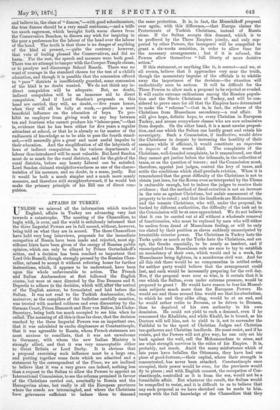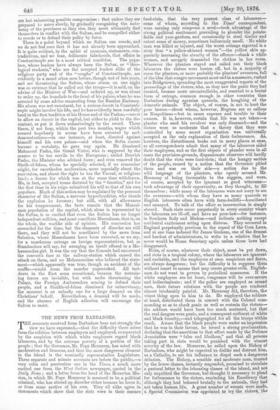AFFAIRS IN TURKEY.
UNLESS we misread all the information which reaches England, affairs in Turkey are advancing very fast towards a catastrophe. The meeting of the Chancellors, to begin with is over, and the world is sedulously informed that the three Imperial Powers are in full accord, without, however, being told on what they are in accord. The three Chancellors have held very long interviews, proposals for the immediate occupation of Bosnia have been made and rejected, most sig- nificant hints have been given of the energy of Russian public opinion, which can only be allayed by Prince Gortschakoff's action, and a decision has been reached so important that Lord Odo Russell, though strongly pressed by the Russian Chan- cellor, refused to accept it without referring home for further instructions, which, it appears to be understood, have been upon the whole unfavourable to action. The French and Italian Ambassadors at first followed the English course, but were at once directed by the Duc Decazes and S. Depretis to adhere to the decision, which will,Yifter. the arrival of the English answer, be formulated and laid before the • Sultan. It was not read to the Turkish Ambassador, who, moreover, as the compilers of the bulletins carefully mention, was treated with marked coldness and even discourtesy by the German Court, Prince Bismarck and Herr von Billow, his Under- Secretary, being both too much occupied to see him when he called. The meaning of all this is thus far clear, that the decision reached by the three Imperial Powers was an important one, that it was calculated to excite displeasure at Constantinople, that it was agreeable to Russia, whom French statesmen are most anxious to conciliate, that it was not unwelcome to Germany, with whom the new Italian Ministry is strongly allied, and that it was very unacceptable either to Great Britain or Lord Derby. It is obvious that a proposal exercising such influence must be a large one, and putting together some facts which are admitted and a statement by the correspondent of the Times, we are inclined to believe that it was a very grave one indeed, nothing less than a request to the Sultan to allow the Powers to appoint an International Commission, to see the reforms promised in favour of the Christians carried out, nominally in Bosnia and the Herzegovina alone, but really in all the European provinces where the creeds are intermingled, and where the Christians have grievances sufficient to induce them to demand
the same protection. It is, in fact, the Menschikoff proposal over again, with this difference,—that Europe claims the Protectorate of Turkish Christians, instead of Russia alone. If the Sultan accepts this demand, which is to be proffered by the Three Empires jointly, and only sup- ported by other Powers, the insurgents will be compelled to grant a six-weeks armistice, in order to allow time for the necessary arrangements ; but if it is refused, the Powers allow themselves "full liberty of more decisive action."
If this statement, or anything like it, is correct—and we, at all events, believe that it approaches very near the truth, though the momentary impulse of the officials is to whittle away the importance of the decision—the situation will undoubtedly soon be serious. It will be difficult for the Three Powers to allow such a proposal to be rejected or evaded. It will excite extreme enthusiasm among the Russian popula- tion and the Slavic Christians of Turkey, and will be con- sidered to prove once for all that the Empires have determined to make the "reforms"—that is, in fact, the release of the Christians from Mussulman ascendency—a real affair. It will give hope, definite hope, to every Christian in European Turkey, and arouse everywhere classes who are now submissive from despair. On the other hand, it is a most unwise proposi- tion, and one which the Sultan can hardly grant and retain his sovereignty. Such a Commission, if ineffective, would drive the Christians to despair by increasing the hostility of their enemies ; while if efficient, it would constitute an imperium in imperio of the worst kind. The complaints of the Christians, well-founded complaints, be it remembered, are that they cannot get justice before the tribunals, in the collection of taxes, or on the question of tenure ; and the Commission must, therefore, appoint just judges, control the levy of taxes, and settle the conditions which shall preclude eviction. When it is remembered that the great difficulty of the Christians is not to obtain just laws, for the Koran even as interpreted by the Ulema is endurable enough, but to induce the judges to receive their evidence ; that the method of fiscal extortion is not an increase in the rate as against Christians, but unfair assessment of the property to berated; and that the landlords are Mohammedans, and the tenants Christians, who will, under the proposal, be backed by different authorities, the difficulty of the task set to the Commission will be at once appreciated. We do not believe that it can be carried out at all without a wholesale removal of functionaries, who must be replaced by men who will either be useless from dread of Mussulman feeling, or will be only too elated by their position as slaves suddenly emancipated by irresistible exterior power. The Christians in Turkey hate the Turks quite as much as the Turks hate the Christians, and are apt, the Greeks especially, to be nearly as insolent, and if emancipated from Mussulman rule are sure to try to establish an ascendency of their own, which would end in a week, the Mussulmans being fighters, in a murderous civil war. And for all this risk there would be no compensation in settled order, for neither party would believe that the arrangement could last, and each would be incessantly preparing for the evil day. Nor, if the proposal were ever so wise, is it certain that it is one which the Sultan, even under extreme pressure, would be prepared to grant ? He would have reason to fear his Mussul- man subjects much more than the European Powers. He would see and those around him would see that his absolutism, to which he and they alike cling, would be at an end, and he would rather retire to Broussa, or be driven to Bronssa, than be deprived of his own authority in his own dominion. He could not yield to such a demand, even if he renounced the Khalifate, and while Khalif, he is bound, as his Doctors will tell him, not to yield to it, not to surrender the Faithful to be the sport of Christian Judges and Christian tax-gatherers and Christian landlords. He must resist, and if he resists, 4nd the Powers will not give way, he can only set his back against the wall, call the Mohammedans to arms, and see what strength survives in the relics of his Empire. It is, probably, not much. Amid the many misfortunes which of late years have befallen the Ottomans, they have had one piece of good-fortune,—their capital, where their strength is concentrated, has never been attacked. Constantinople once occupied, their power would be over, for the provinces would fly to pieces ; and with English consent, the occupation of Con- stantinople, controlled as it is from the sea, would not be a formidable affair. But whatever the result, the Sultan would be compelled to resist, and it is difficult to us to believe that any such proposal as we have sketched can be made to him, except with the full knowledge of the Chancellors that they are but esizawsting possible compromises ; that unless they are prepared to move slowly, by gradually recognising the auto- nomy of the provinces as they rise, they must ultimately find themselves in conflict with the Sultan, and be compelled either to recede or to defend their policy by force.
There is a point beyond which no Sultan can recede, and we do not feel sure that it has not already been approached. It is quite evident, in the midst of rumours, statements, con- tradictions, and we fear, deliberate falsehoods, that affairs in Constantinople are in a most critical condition. The popu- lace, whose leaders have always been the Softas, or "theo- logical students," who are the accepted leaders alike of the religious party and of the "roughs" of Constantinople, are evidently in a mood often seen before, though not of late years, and are threatening the Sultan, whose alarm on one night was so extreme that he called out the troops—it is said, on the advice of the Minister of War—and ordered up, or was about to order up, the ironclads to the front of his palace, when he was arrested by some advice emanating from the Russian Embassy. His alarm was not unnatural, for a serious entente in Constanti- nople might involve his life, and be has evidently been carefullr bred in the first tradition of his House and of the Pashas,—never to allow an imeute in the capital, but either to yield to the dis- content, or pat it down unhesitatingly by the sword. Three times if not four, within the past two months, wages which seemed hopelessly in arrear have been extorted by mob demonstrations—in one instance, at least, directed against himself and his own palace—and when the Softa eineute became a certainty, he gave way again. He dismissed Mahmoud Pasha, the Grand Vizier, who is supposed by the masses to be too servile to the Europeans ; exiled Dervish Pasha, the Minister who advised force ; and even removed the Sheik-ul-Islam, whom he specially selected, if we remember aright, for unorthodox moderation, more especially about the succession, and about the right to tax the Vacouf, or religious la,nd9, a decree for which was at the same time withdrawn. He, in fact, accepted terms dictated by the "fanatics," and for the first time in his reign submitted his will to that of his own populace. Much of this action may be explained by the personal character of the Sultan, a nervous hypochondriac, who dreads the explosion he foresees ; but still, with all allowances for his temperament, the facts remain that the Mussul- man population of the capital, which alone is represented by the Softas, is so excited that even the Sultan has no longer independent volition, and must conciliate Mussulma,n, that is, on the whole, the warlike side of opinion. His concession has succeeded for the time, but the elements of disorder are still there, and they will not be conciliated by the news from Salonica, where Mussulmans have been executed, as we say, for a murderous outrage on foreign representatives, but as Stemboulees will say, for avenging an insult offered to a Mo- hammedan girl. It was the cry that the Consuls had uncovered the convert's face at the railway-station which caused the attack on them, and no Mohammedan who believed the state- ment—which apparently was true, though an accident of the souffle—would deem the murder unprovoked. All inci- dents in the East seem sensational, because the restrain- ing forces are invisible, but with mobs threatening the Palace, the Foreign Ambassadors arming to defend their people, and a Sheikh-ul-Islam dismissed for subserviency, the moment is an unlucky one for a large demand on the Christians' behalf. Nevertheless, a demand will be made, and the absence of English adhesion will encourage the Sultan to resist.































 Previous page
Previous page